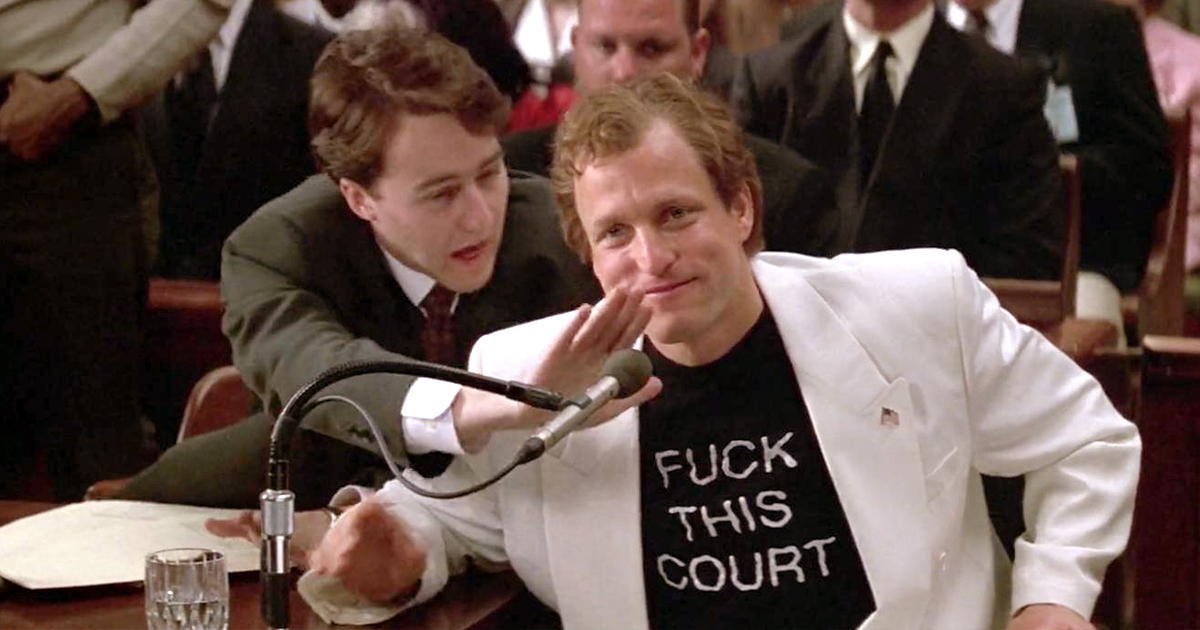[8]
Director Milos Forman (Amadeus) tackles the life of Hustler magazine founder Larry Flynt with Woody Harrelson playing the infamous smut-peddler. The screenplay, another superb biography from Ed Wood screenwriters Scott Alexander and Larry Karaszewski, focuses on Flynt’s many legal battles, leading all the way up to a climactic Supreme Court case against the Reverent Jerry Falwell (Richard Paul) that beautifully captures the perennial American conflict between free speech and defamation. If The People vs. Larry Flynt stands out for anything, it’s in the way it makes a lewd, crude pornographer the embodiment of the First Amendment — and successfully so. Flynt won that case in a unanimous vote.
The legal battles in the film gain dramatic weight from many antagonistic scenes between Flynt and his long-time lawyer, played by Edward Norton (Fight Club). Norton’s character is exceptionally good at what he does, but he’s constantly embarrassed by a client who is often under the influence of painkillers and other drugs. At one point, Flynt shows up to court wearing a diaper fashioned out of the American flag, spitting at people and provoking the judge. When the judge reaches the end of his rope, he sentences Flynt to over a year in a psychiatric prison — just one of many horrors (some self-inflicted, some not) that Flynt endures over the course of the film.
Alexander and Karaszewski, who also wrote biopics about comedian Andy Kaufman (Man on the Moon) and artist Margaret Keane (Big Eyes), know how to reduce a public figure’s sprawling life story to a well-focused feature-length time frame better than anyone. They center on Flynt’s legal battles as a way to capture two decades of American social progress and relaxing morality, but within that superstructure, there’s also a rags-to-riches story, an intriguing subplot involving Flynt’s ‘finding religion’ with the help of President Jimmy Carter’s sister (Donna Hanover), and a tragic love story between Flynt and his fourth wife, Althea. Althea is played by Courtney Love, who carries the film almost as much as Harrelson does. She gives an uncouth but earnest vivacity to the role, ultimately becoming an object of pity as Althea succumbs to addiction and complications arising from AIDs. Even though the film is built around the courtroom battles, its heart is very much — and very wisely — in the relationship between Larry and Althea.
Forman keeps this two-hour, ten-minute drama moving fast, with never a dull moment. The title character offers up all the comedy and sensation you might imagine, but the film also succeeds in stripping its clownish characters down to their raw, human selves for some genuinely moving drama. There are also some thrills and scares, particularly when Flynt and his lawyer are shot by a still-unknown gunman, an incident that left Flynt paralyzed for life (and unable to have sex). Thomas Newman provides a unique, evocative score and the remarkable supporting cast includes Crispin Glover, James Cromwell, Vincent Schiavelli, and Democratic political strategist James Carville. Woody Harrelson’s real-life brother, Brett Harrelson, plays Larry Flynt’s brother Jimmy, who served as vice-president of Hustler, running the company during all the long stretches in which Flynt was either in jail or institutionalized. Larry Flynt himself appears as one of the many judges.
Oscar Nominations: Best Actor (Woody Harrelson), Best Director (Milos Forman)

